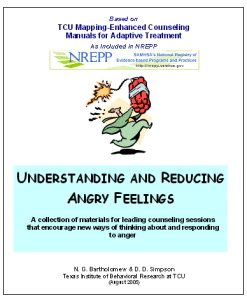
About this intervention
TIC-Anger teaches clients appropriate ways to manage anger so they are more capable of coping with the reality of their situation. This module is considered a basic building block because CJ involved individuals often experience anger, particularly in response to their loss of freedom. The 4-session brief therapeutic intervention is designed to help clients learn to understand and respond to anger in more appropriate ways. They learn to identify anger triggers, differentiate between healthy and unhealthy anger, to set goals, to plan strategies for interrupting angry patterns, and to utilize progressive muscle relaxation. Sections of this intervention include: Understanding Anger, Managing Anger in Relationships, Mapping Worksheets, The Aggression Cycle, and Links of Interest. This intervention includes a collection of materials for leading counseling sessions that encourage new ways of thinking about and responding to anger.
Modular applications in this intervention include:
- Understanding Anger is adapted from a core set of materials developed by Matrix, Inc. (at UCLA) and NDRI for relapse prevention group work. This session included worksheets, handouts, and group leader instruction for facilitating a session on general principles of anger management, including helping participants become more aware of the physical signs and emotional reactions to anger and frustration. Group leader discussion questions are provided to help encourage clients to talk about the situational aspects of anger and strategies for self-regulation.
- Managing Anger in Relationships is part of the Straight Ahead: Transition Skills for Recovery intervention developed at TCU. This session features a leader’s script, with notes, worksheets, and handouts for leading a solution-focused or strengths-based discussion of managing anger. Participants are invited to think about times when they have been able to successfully manage angry feelings and to think about how to build on those successes. Materials for a “mini-lecture” highlight healthy and unhealthy reactions to anger.
- Mapping Worksheets — These Mapping Worksheets were selected from the intervention TCU Guide Maps: A Resource for Counselors because of their specific focus on anger and emotional regulation. Each mapping worksheet follows a “fill in the blank” format to encourage participants to consider various cognitive aspects of how we respond to feelings. Once participants complete their worksheet, group discussions and commentary on the causes and effects of anger and strategies for interrupting angry patterns are facilitated.
- The Aggression Cycle is part of the CSAT workbook Anger Management for Substance Abuse Clients. This session helps participants explore how building feelings of anger and resentment can spiral into a cycle of explosive or destructive behavior. Leader’s notes and worksheets are included, with activities that encourage participants to pay attention to physical and emotional “warning signs” for explosive anger. Instructions for leading a relaxation technique are included.
- Links of Interest — Websites featuring materials on anger.
The Understanding and Reducing Angry Feelings intervention may be freely used for personal, educational, research, and/or information purposes only. Permission is hereby granted to reproduce and distribute copies of content material (except reprinted passages from copyrighted sources) for nonprofit educational and nonprofit library purposes, provided that copies are distributed at or below costs and that credit for author and source are included on each copy. No part of any material may be copied, downloaded, stored in a retrieval system, or redistributed for any commercial purpose without the expressed written permission of Texas Christian University.
Recommended Citation: Bartholomew, N. G., & Simpson, D. D. (2005). Understanding and reducing angry feelings. Fort Worth: Texas Christian University, Institute of Behavioral Research. Available: the IBR Website: www.ibr.tcu.edu